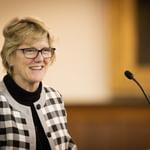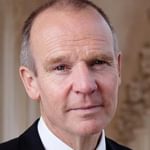Event Recording:
Since their widespread deployment in the mid-20th century, effective antibiotics have been at the forefront of medicine saving countless lives.
But the last two decades have seen an alarming rise in pathogens resistant to antibiotics (anti-microbial resistance or AMR), while there are fewer novel antibiotics in the research and development pipeline. During her time as the UK’s Chief Medical Officer, and since leaving that position in 2019, Dame Sally Davies, the UK Special Envoy on Antimicrobial Resistance, has been tireless in pointing out the great dangers of AMR to health throughout the world and suggesting what needs to be done.
In conversation with Chris Dye, Sally Davies will explore this major 21st century challenge and discuss whether people’s greater appreciation of medical risk due to the pandemic will help the development of effective countermeasures.

Professor Dame Sally Davies
UK Special Envoy on Antimicrobial Resistance
Dame Sally is UK Special Envoy on Antimicrobial Resistance and Master of Trinity College at Cambridge University.
Before this, she was Chief Medical Officer (CMO) for England and Chief Medical Adviser to the UK government from March 2011 to September 2019, having held the post on an interim basis since June 2010.
Dame Sally advocates globally on AMR. She has spoken on AMR at numerous events including the World Health Assembly side events, the G8 science ministers’ meeting in 2015, the Global Health Security Initiative in 2015, and the UN General Assembly side event in 2016. She was chair of the 2013 AMR forum at the World Innovation Summit for Health (WISH) and was for three years the chair of the WHO Strategic and Technical Advisory Group on AMR. Most recently, Dame Sally has been appointed a co-convener of the UN Inter-Agency Co-ordination Group on AMR, set up in response to the AMR declaration made at UNGA 2016.
Dame Sally was a member of the World Health Organization (WHO) Executive Board 2014-2016 and has led delegations to a range of WHO summits and forums since 2004.
She is currently a non-executive director on the boards of: The Institute for Health Metrics and Evaluation; Genomics England Ltd; The Blavatnik School of Government, University of Oxford; The Clinton Health Access Initiative; and UK Research & Innovation. She was formerly on the boards of Cumberland Lodge and Ashridge Business School.
From 2004-2016, Dame Sally was the Chief Scientific Adviser (CSA) for the Department of Health (DH), where she was actively involved in NHS R&D from its establishment and founded the National Institute for Health Research (NIHR).
Dame Sally received her DBE in 2009. She was elected Fellow of the Royal Society in 2014 and a member of the National Academy of Medicine, USA in 2015.

Professor Chris Dye
Professor of Epidemiology
Chris Dye began professional life as an ecologist in the UK, having been awarded degrees in biology (BA) from the University of York and zoology (DPhil) from the University of Oxford.
After developing an interest in infectious diseases at Imperial College London, he moved to the London School of Hygiene and Tropical Medicine to bring his research closer to public health. He was head of the School’s Vector Biology and Epidemiology Unit until 1996, carrying out research on leishmaniasis, malaria, rabies and other infectious and zoonotic diseases in Africa, Asia and South America.
In 1996, he joined the World Health Organization where he developed methods for using national surveillance and survey data to study the large-scale dynamics and control of tuberculosis (TB) and malaria, and Ebola and Zika viruses. As WHO’s Director of Strategy between 2014 and 2018, he worked with governments and other agencies to strengthen WHO's scientific work and to translate science into health policy.
From 2006 to 2009, he was also Professor of Physic at Gresham College, 35th in a lineage of professors that have been giving public lectures in the City of London since 1597.
During the Covid-19 pandemic, Chris led the work of a UK-wide group of scientists to set out the evidence and the facts on COVID-19 through “Coronavirus: The Science Explained”, a website hosted by UK Research and Innovation, the UK's funding agency for science and research. He is also a member of the Royal Society SET-C steering committee that provides rapid science advice on the pandemic to government (https://royalsociety.org/topics-policy/projects/set-c-science-in-emergencies-tasking-covid/).
Keep in touch
If you found this page useful, sign up to our monthly digest of the latest news and events
Subscribe